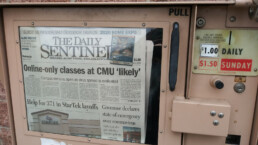by Caitlin Schneider, Discourse Blog
Local news has famously been in a sorry state of decline, crisis, and catastrophe for decades. Newspaper newsroom employees have dropped 57 percent since 2004. Thousands of newspapers have shut down at a rate of about two a week, according to one study. As of last year, research suggests that a fifth of the U.S. population lives in a news desert, or in a community that’s on its way to becoming one.
It’s honestly pretty bleak, and the state of your own local news ecosystem is probably enough to convince you of that. It’s not just a loss of invaluable coverage, regional identity, and specific service journalism. The quiet murder of this once-booming business encapsulates an existential panic that goes about as far as you want to take it: The decline in local news outlets is bad for communities, bad for American politics, bad for civic engagement, and exacerbates socioeconomic divisions. Poverty rates are higher in news deserts, which are a source of countless problems like decreased voter participation, increased corruption, and lagging trust in both the media and democracy itself. What’s more, a startling number of people actually don’t even know this crisis is happening.

Aw yeah baby, let’s absolutely spin out over this. It’s an emergency for journalism and for our democracy!!
OK, it’s not all bad news and it’s not completely hopeless. Emerging digital outlets, public radio, and student journalism have offset the calamity to some degree. To be crystal clear, those are not super-encouraging bandaids on any level (sorry! lol), but they are something. The upheaval of the industry has somehow been both a fast and slow car crash. It’s fucked, but there have been small opportunities for adaptation and survival. People are still doing good work, but at a dwarfed and desperate scale, all while cable news blares in the background and a graveyard of fallen outlets recedes further and further from collective memory.
Recent Posts
‘Unconstitutional. Unethical. Authoritarian.’ ICE Bars Millions Of Immigrants From Bond Hearings
July 18, 2025
Take Action Now One watchdog said the new policy “seems like a blatant attempt to stop them from exercising their right to due process.”……
Americans Are Not Nearly Alarmed Enough About Climate Change
July 18, 2025
Take Action Now Americans still don’t comprehend how imminent, dangerous, and far-reaching the threat is—and journalists are partly to blame.By…
The IRS Is Building A Vast System To Share Millions Of Taxpayers’ Data With ICE
July 17, 2025
Take Action Now ProPublica has obtained the blueprint for the Trump administration’s unprecedented plan to turn over IRS records to Homeland Security…
Israel’s Sudden Assault On Syria Is Unchecked Aggression
July 17, 2025
Take Action Now Jerusalem is bombing Damascus and threatening al-Sharaa’s rule, while Washington was hoping to help the nascent government on…




